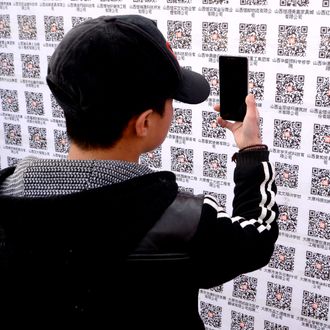
The humble QR code, a square-shaped version of a bar code you may have seen on misguided bus-stop advertisements, was supposed to change the world. Simply boot up your smartphone’s camera, and you could quickly scan codes to pay for stuff, open links to websites, or snag contact info. They never really took off in the U.S., though not for the tech industry’s lack of trying. A half-decade ago, you couldn’t go to South by Southwest without running into approximately 14 bazillion QR codes.
But QR codes were apparently more hassle than they were worth. Users had to stop, pull out their phone, open the scan app, hold their phone against the wall for a few seconds, and hope that the code registered on the sensor. It was a real momentum killer. QR codes are still around — variants of the format are often used as shortcuts to adding contacts on Snapchat and Facebook Messenger — but you’re less likely to see them manifest tangibly in the real world.
Except in China, where, according to The Wall Street Journal, QR codes have become a part of everyday life thanks to WeChat, the Swiss-Army-knife app that people use to call cabs, pay for things, and text friends, among other functions. WeChat’s founder, Allen Zhang, is reportedly obsessed with them, and frequently extols their virtues. In one recent 90-minute speech he mentioned them 22 times.
Many Chinese users, according to the Journal, simply leave their wallets at home and transfer money exclusively via the app. “More than 95% of China’s 731 million online population access the internet via their smartphones,” they write, “and half made offline, in-store mobile payments in 2016, according to a report released by the China Internet Network Information Center.” In addition, QR codes have replaced rituals like the business-card exchange.
Is there anything to take away from this, besides that we must crush China to ensure the QR code is never adopted here? Among other things, it’s a good reminder of the phenomenal success of WeChat. The app, by virtue of its versatility, is how many Chinese residents spend their time online; it’s practically an operating system itself, and it’s made China’s internet economy different from the Western world’s. Chatbots, for example, are a booming business in China, thanks to WeChat’s huge popularity — but despite loud pronouncements of looming chatbot ubiquity Stateside, they’ve fizzled here in the U.S. They may have their day yet — but if the QR code is any indication, there are just some ideas that make more sense in a world where the default internet experience is WeChat instead of Facebook.





























